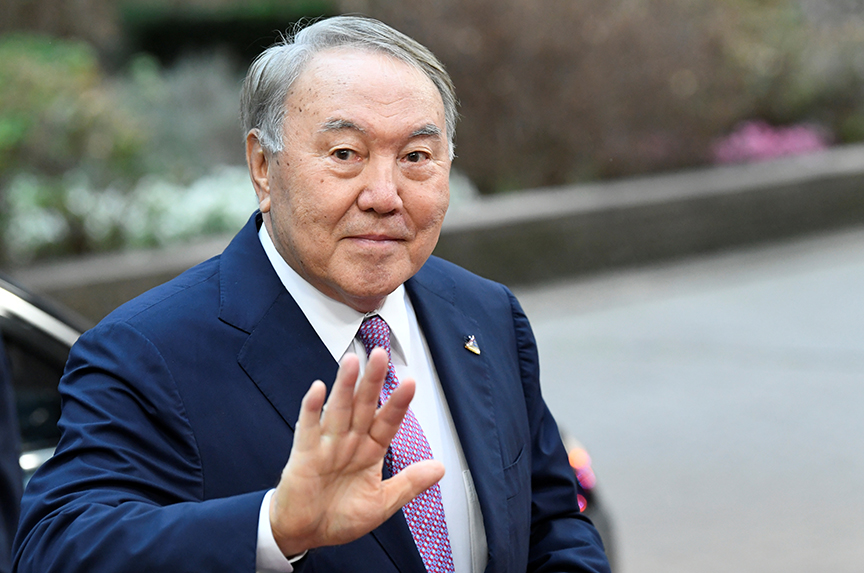On March 22, instead of the usual festive mood in celebration of Nowruz, citizens of Kazakhstan were feeling disoriented and confused. The past week had been a politically turbulent one for this Central Asian nation.
Politics and people have existed in separate domains in Kazakhstan, but on March 19, politics made an unexpected return into the lives of ordinary people when Kazakh President Nursultan Nazarbayev made a surprising announcement about his decision to resign with immediate effect.
While people were still processing this news (the seventy-eight-year-old Nazarbayev had ruled Kazakhstan for almost thirty years), they were informed that Kazakhstan’s capital, Astana, was to be renamed Nur-Sultan in Nazarbayev’s honor. Parliament quickly approved the initiative put forward by acting President Kassym-Jomart Tokayev, who previously served as chairman of the Senate.
The public reaction to Nazarbayev’s resignation and the renaming of the capital has been mixed. While some Kazakhs are optimistic about the prospects for political change, others are less so. Most people hope to see a calm, managed political transition from one authoritarian regime to another.
A majority of experts expect a smooth and trouble-free transition seeing as Kazakhstan is said to be a post-Soviet version of smart authoritarianism where wise and balanced leadership has produced economic development and political stability.
The question is to what degree these dominating narratives reflect the reality of today’s Kazakhstan where stories of economic and political success are often used as a façade to mask deeper structural problems and social tensions.
Narrative #1: “Economy first, democracy later”
As with many other authoritarian regimes, Nazarbayev used economic development to legitimize his indefinite stay in power starting with mid-90s when he dismissed the only independent Parliament Kazakhstan has ever had. As he aptly summarized his belief during the 2015 presidential election, “democracy is not the starting point of our way, it is the final point of our destination.”
By the look of macroeconomic indicators, Kazakhstan seems to perform well compared to other post-Soviet states when it comes to GDP growth, poverty rates, and quality of life. Since 1991, Kazakhstan’s economy has grown by more than twenty times. In the mid-2000s, Kazakhstan moved from lower-middle to upper-middle income category, which is more than can be said for many other former Soviet states.
However, this economic success is a story primarily of the first two decades of Nazarbayev’s rule when resource-rich countries worldwide reaped the benefits of high oil prices.
In the 2010s, when oil prices dropped, Kazakhstan’s economic growth quickly went into recession largely because of a lack of significant diversification of the country’s resource-dependent economy, which was vulnerable to external shocks.
Nazarbayev and his elites have tried to address structural weaknesses by launching new reforms and modernization programs, but economic reforms cannot be effective when coupled with weak political institutions, lack of rule of law, and all-pervasive corruption.
On February 21, less than a month before his resignation, Nazarbayev indirectly recognized his socioeconomic failures when he fired his cabinet saying it had failed to raise income and living standards for Kazakhstan’s citizens.
Narrative #2: Political stability
Nazarbayev has always touted himself as a wise political leader who has managed to rule a multiethnic nation without any episodes of conflicts or violence.
The discourse about political stability has been especially emphasized after Russia’s annexation of Crimea in 2014 that turned into a protracted conflict with Ukraine. As Nazarbayev said in 2016, “Ukraine, the second-biggest ex-Soviet state, today has an economy which is half the size of Kazakhstan’s, because there is no unity.”
It is true that Kazakhstan has been among the few former Soviet states that have not experienced any largescale mass protests. This led some analysts to believe Kazakhs are satisfied with Nazarbayev’s regime. However, there could be another explanation as to why we have not seen mass protests in Kazakhstan.
In 2011, when oil workers protested in the small town of Zhanaozen in Kazakhstan’s western Mangystau Region, sixteen people (according to official statistics) died as a result of violent clashes with police. Nazarbayev declared a state of emergency in the region giving law enforcement unlimited authority to make mass arrests, carry out brutal interrogations, and inflict torture.
The situation in Zhanaozen is rarely mentioned in discussions about Nazarbayev’s Kazakhstan as this episode clearly falls outside the narrative of a modernizing regime. The crackdown in Zhanaozen sent a clear signal to the people that all serious challenges to the system would be brutally and mercilessly repressed and that the police was loyal to Nazarbayev and would not hesitate to use lethal force against dissenters.
Despite the fear of repression and public disengagement with politics, the past few years have seen multiple protests, including over the devaluation of the national currency, the tenge, in 2014; controversial land reform in 2016 that allowed foreigners to rent agricultural land in Kazakhstan for twenty-five years; and the “mothers’ protests” this year following a fire in Astana that claimed the lives of five children. While these protests have not produced a major uprising, they have heightened social tension.
At first glance, Nazarbayev’s resignation may have been motivated by his determination to oversee a peaceful and managed power transition. However, given the growing gap between elites and the ordinary people, the lack of political accountability, and strong public mistrust toward state institutions,
Dinara Pisareva is the co-author of The Last Days of Nomadism: Soviet Power in Kazakhstan.
Image: Kazakh President Nursultan Nazarbayev waved to supporters after his victory in the presidential election was officially announced in Astana, Kazakhstan, on December 5, 2005. Nazarbayev announced on March 19, 2019, that he was resigning after almost thirty years in office. (Reuters/Stringer/File Photo)

